With a coastline of powder-sand beaches, flanked by historic buildings and topped off by a series of exceptional national parks, it’s no surprise that traveling to Croatia is a dream of many.
The natural beauty is on full display as you venture from one historical city to the next. But such is the stunning architecture found within each city, it’s as if the buildings are as natural as the trees themselves.
Top Things to do in Croatia
There are many amazing things to do in Croatia, from visiting the Roman Amphitheater to the unique Museum of Broken Relationships. In a country with so many unforgettable experiences, we’ve taken on the strenuous gig of narrowing it down to 20.
Our list will help you experience the best of Croatia. By exploring its history, culture, gorgeous beaches and remote islands.
Plitvice Lakes National Park
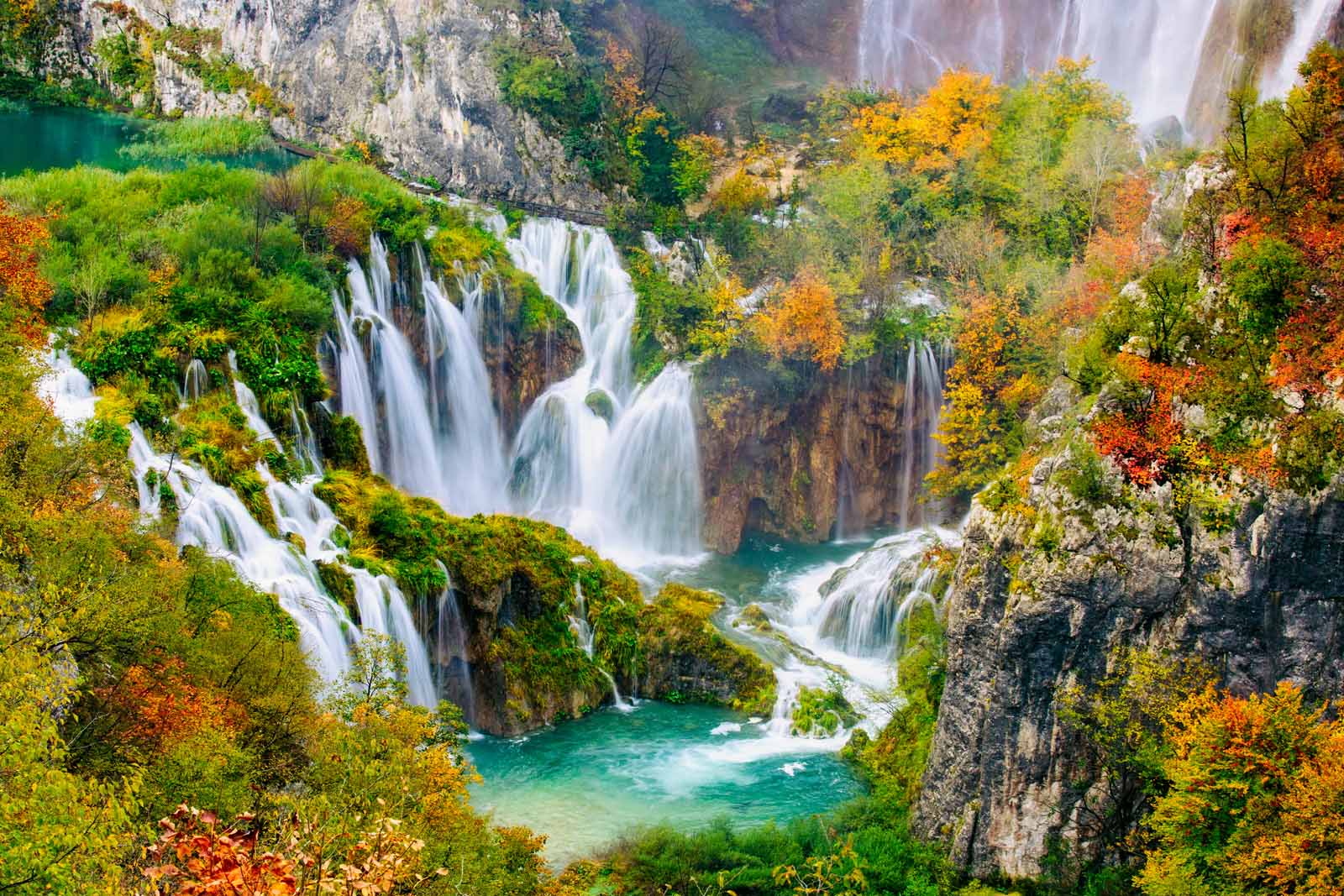
Like a scene out of a fairytale, the Plitvice Lakes National Park features immense blue lakes all connected by tumbling forest waterfalls that guide you like a row of steps.
One of the best national parks in Croatia, and certainly the most visited, Plitvice National Park, was the first of its kind in the Land of a Thousand Islands. Taking from Croatia’s nickname, the spectacular park combines dense rainforest with inland waterways, which you can easily travel between on a series of footpaths and storybook bridges.
Plitvice Lakes are prime environment for many native and migratory animals, from wolves to bears and owls to falcons. There are many tours leaving from the nearby cities of Zadar and Zagreb, but you can also explore on your own whim.
The Blue Cave
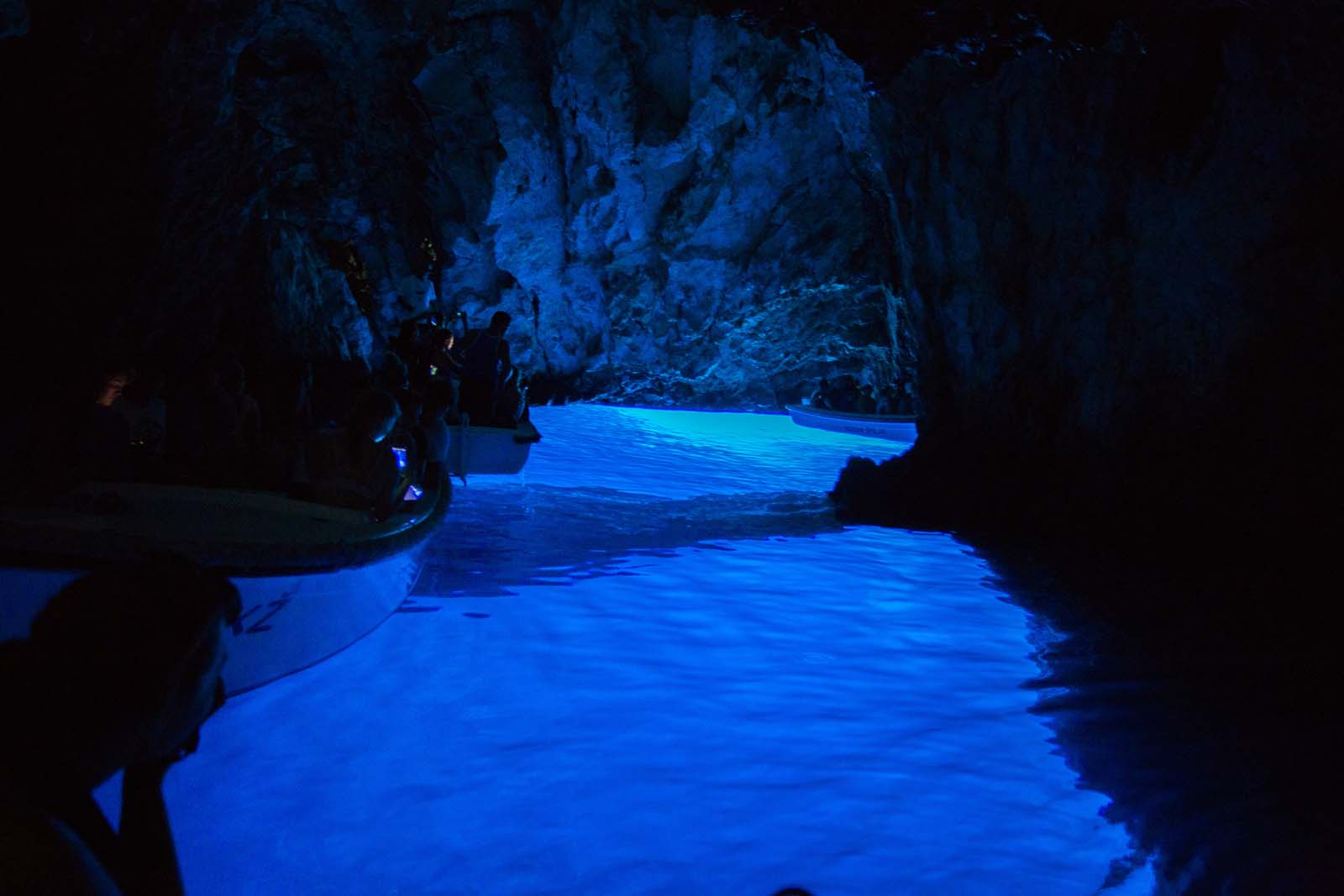
Speaking of incredible water scenery, one of the best things to do in Croatia is to explore the Blue Cave on Bisevo Island. The cave is more than what may immediately come to mind. Enveloped by bright blue lights, with the water’s surface shimmering in the reflection, the Blue Cave is a sight to behold.
Getting to the grotto from the mainland can be a tricky exercise. The popularity of the attraction means you’ll have to book in advance and go on a guided tour. However, upon arrival, with the sun beaming down from above and the water gleaming back, it promises to be an unforgettable experience.
Trogir – UNESCO World Heritage Site
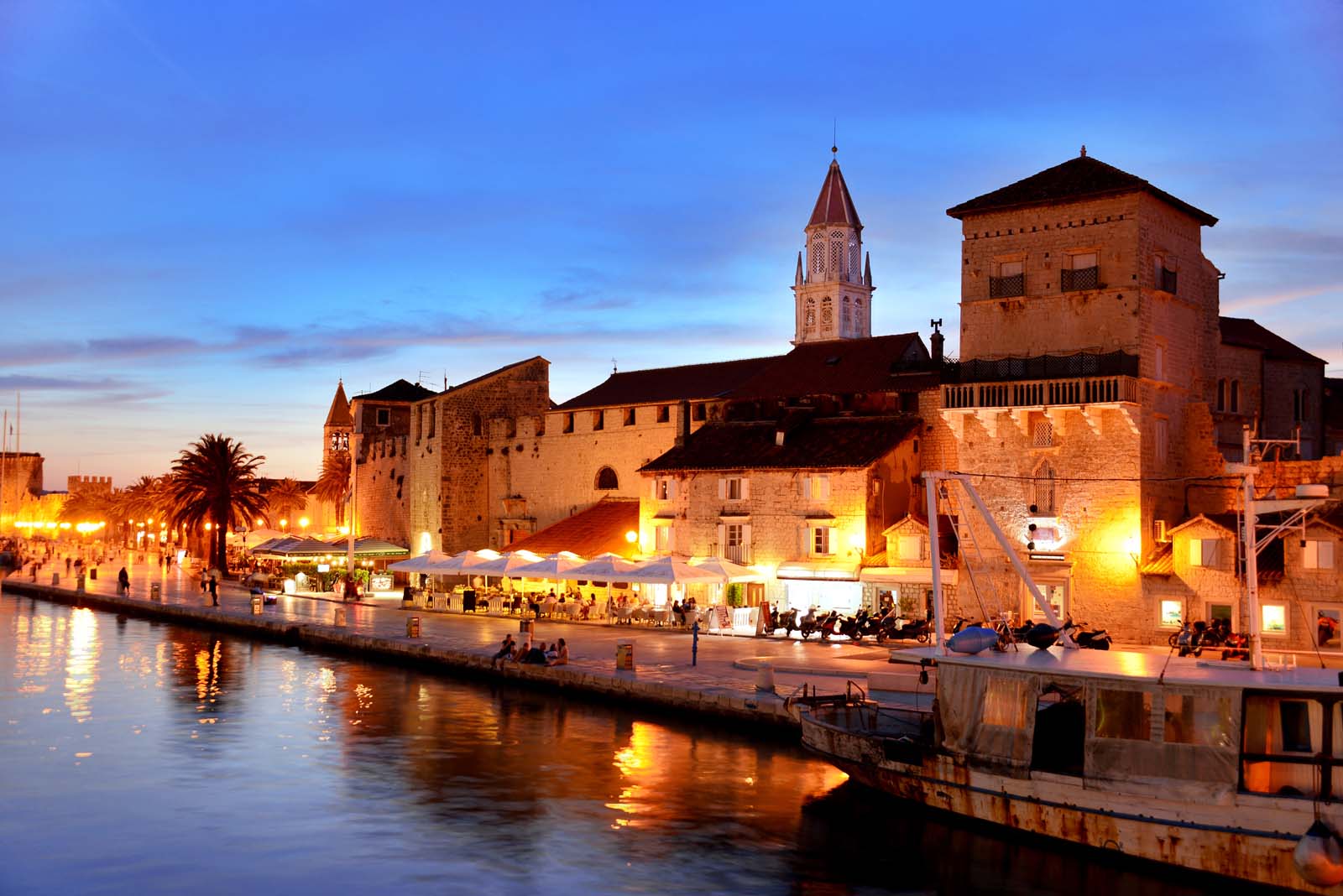
If you’re still working through what to do in Croatia, make sure you find plenty of room for Trogir on your Croatia itinerary. On Croatia’s impeccable Dalmatian Coast, Trogir has a rich history which dates back to the 4th century.
In 1997, Trogir became a UNESCO World Heritage Site thanks to the preservation of Roman architecture that lines the narrow streets. Walking and admiring is a great thing to do here, plus you can enjoy the amazing Trogir Cathedral and the Church of St. Peter.
If you’re a fan of seafood, then you’ll also fall in love with the cuisine in one of Croatia’s most historic cities.
Zadar’s Sea Organ and Sun Salutation
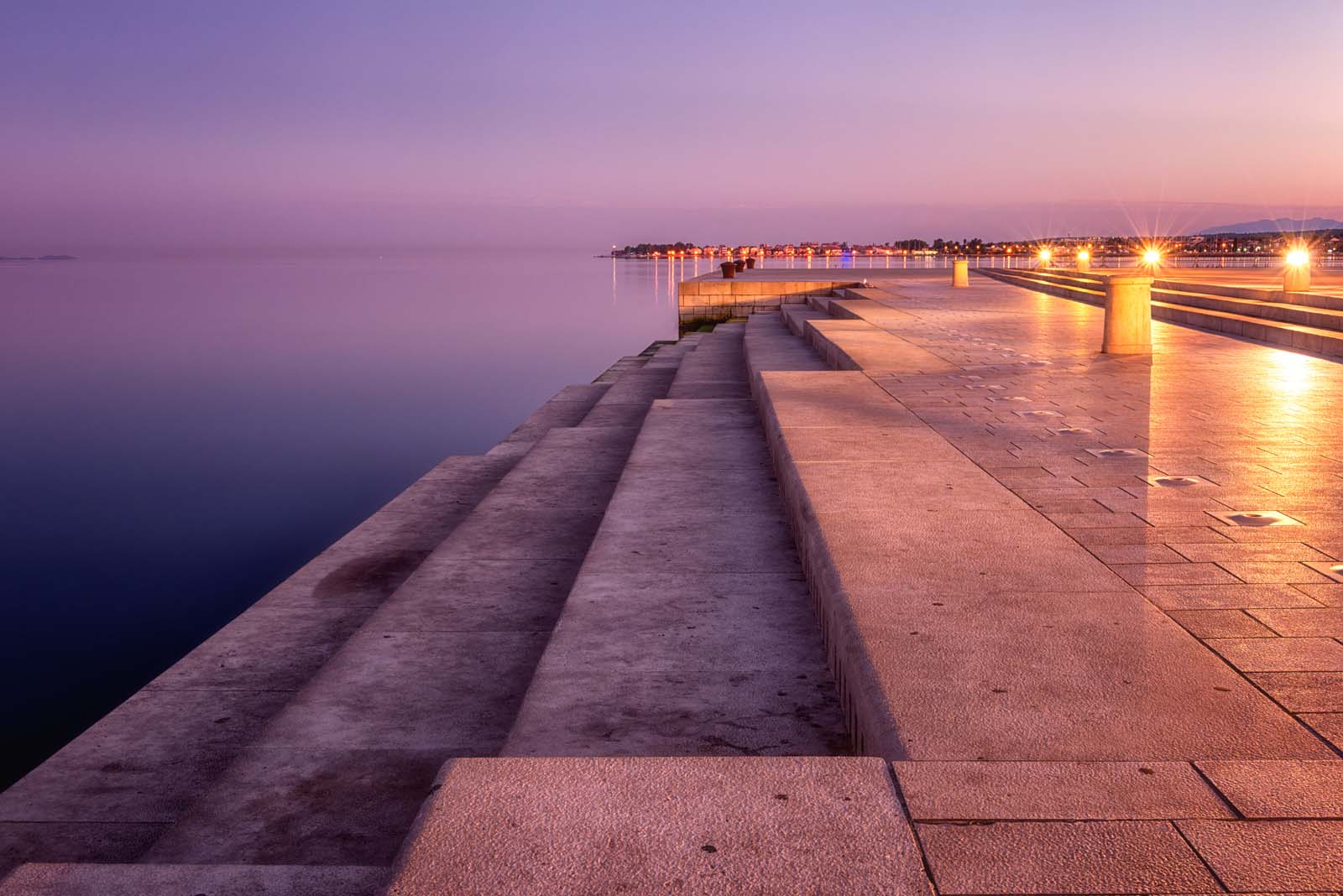
When traveling through Zadar, on the Adriatic Sea, you must stop by the city’s sea organ. Playing the tunes of the ocean’s waves, the organ converts the rhythm of the water through 35 pipes built under the marble steps.
Each pipe is of different sizes and lengths, creating a diverse array of sounds that will delight the ear. While you can visit at any time of day, nothing beats enjoying a sunset on the water and a chance to appreciate the Sun Salutation.
Throughout each day, the Salutation, which is a large solar panel, absorbs the sun’s rays. It stores enough energy to light up all of Zadar’s waterfront once the sun has gone down.
Krka National Park
Spliced by the thundering Krka River, this national park features seven jaw-dropping waterfalls, each as picturesque as the last. Just an hour away from Split, Krka National Park is easily accessible.
After your brief drive into the park, you’ll feel a world away from the cobbled streets and UNESCO World Heritage Sites. Surrounding you is vast, untouched wilderness with the ever-present roar of the river.
The highlights of the Krka National Park is the Skradinski Buk. Come here for towering waterfalls that cascade into a crystal-clear swimming hole. Hikers will also stumble upon Roman ruins.
Sail Week
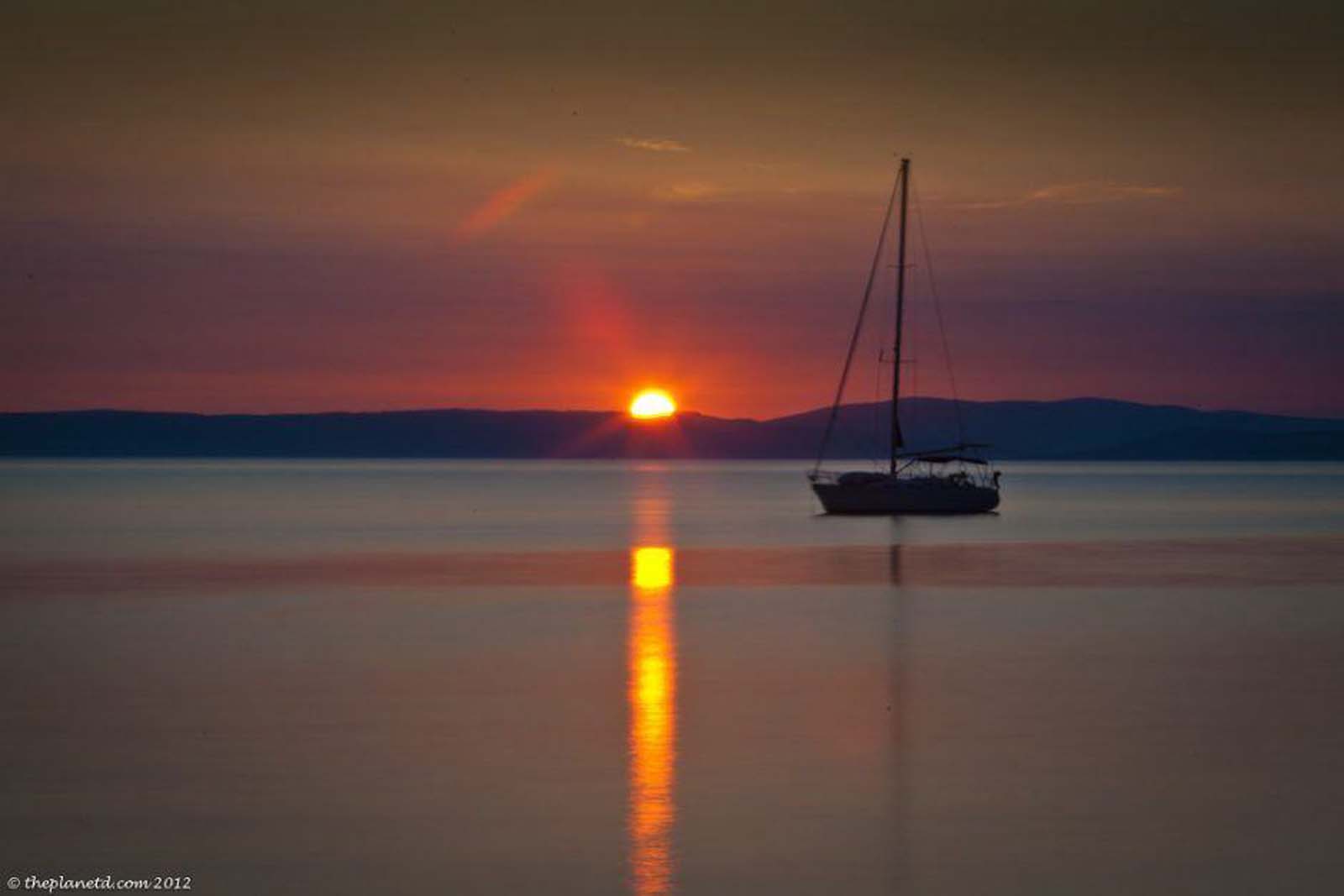
Nothing in Croatia gets quite as much promotion as Yacht Week. Where scantily clad men and women dance upon the ocean with plenty of booze in hand. But what if there was something more your speed? More adventurous with the same amount of island hopping. Welcome to Sail Week.
Bid adieu to the hangovers and explore Croatia’s many islands with a clear mind. Kayak along Croatia’s Adriatic Coast, or try your hand at SUPing. Later, hike inland before taking helm and sailing off-shore, with the help of your skipper, of course.
Old Town, Dubrovnik
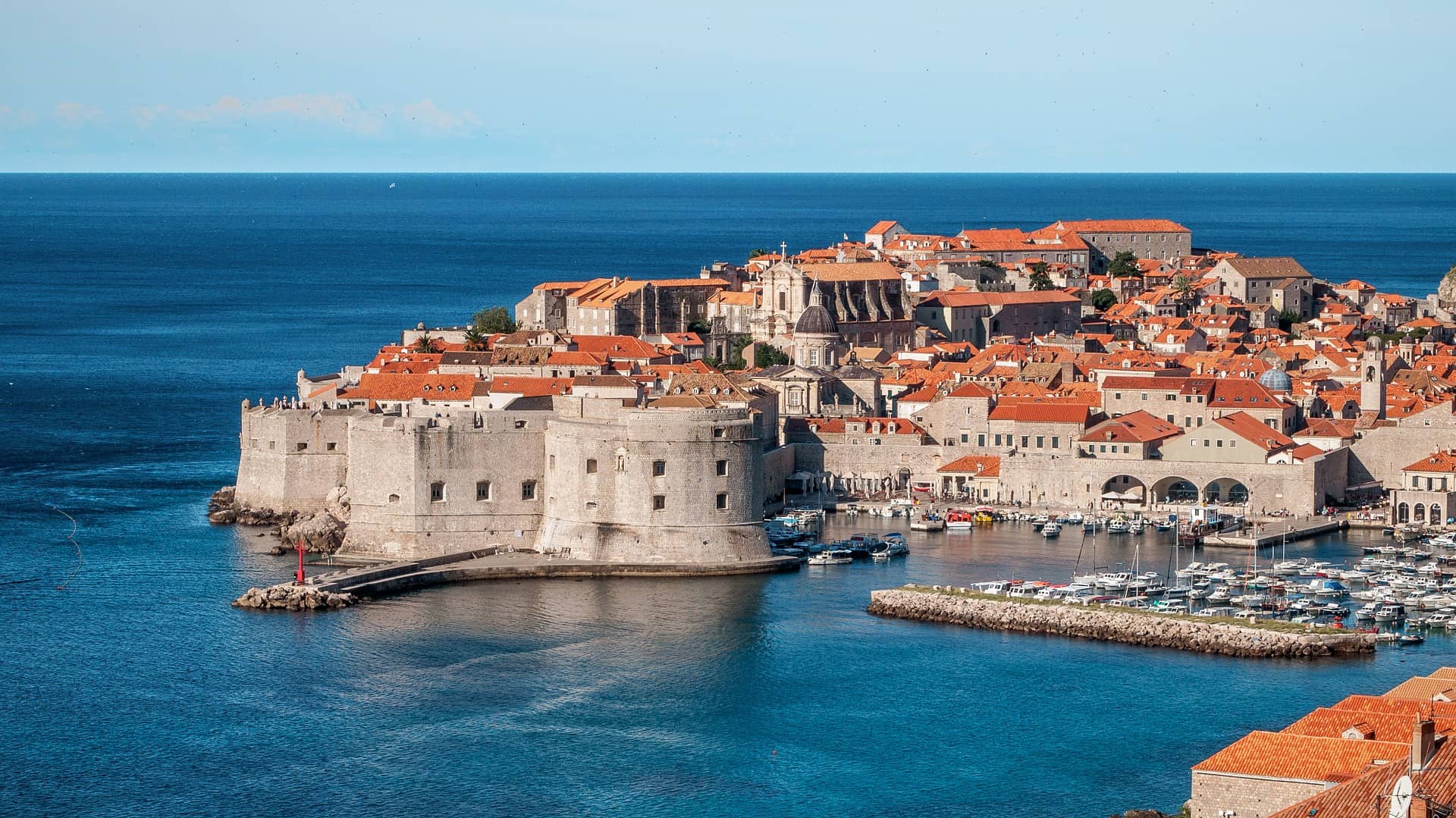
There’s a difference between a tourist trap and something that’s popular for a good reason. Dubrovnik’s Old Town may be one of the top tourist attractions, but it offers an amazing insight into Croatian culture.
With so much to do, you could set aside multiple days to explore. The medieval town was completed around the 13th century and is encapsulated by walls that stretch for 1.2 miles. Fit with towers and bastions, the wall was a fortress that protected Dubrovnik for centuries.
Besides seeing the walls, visit museums, art galleries and dine within ancient stone buildings.
Pula
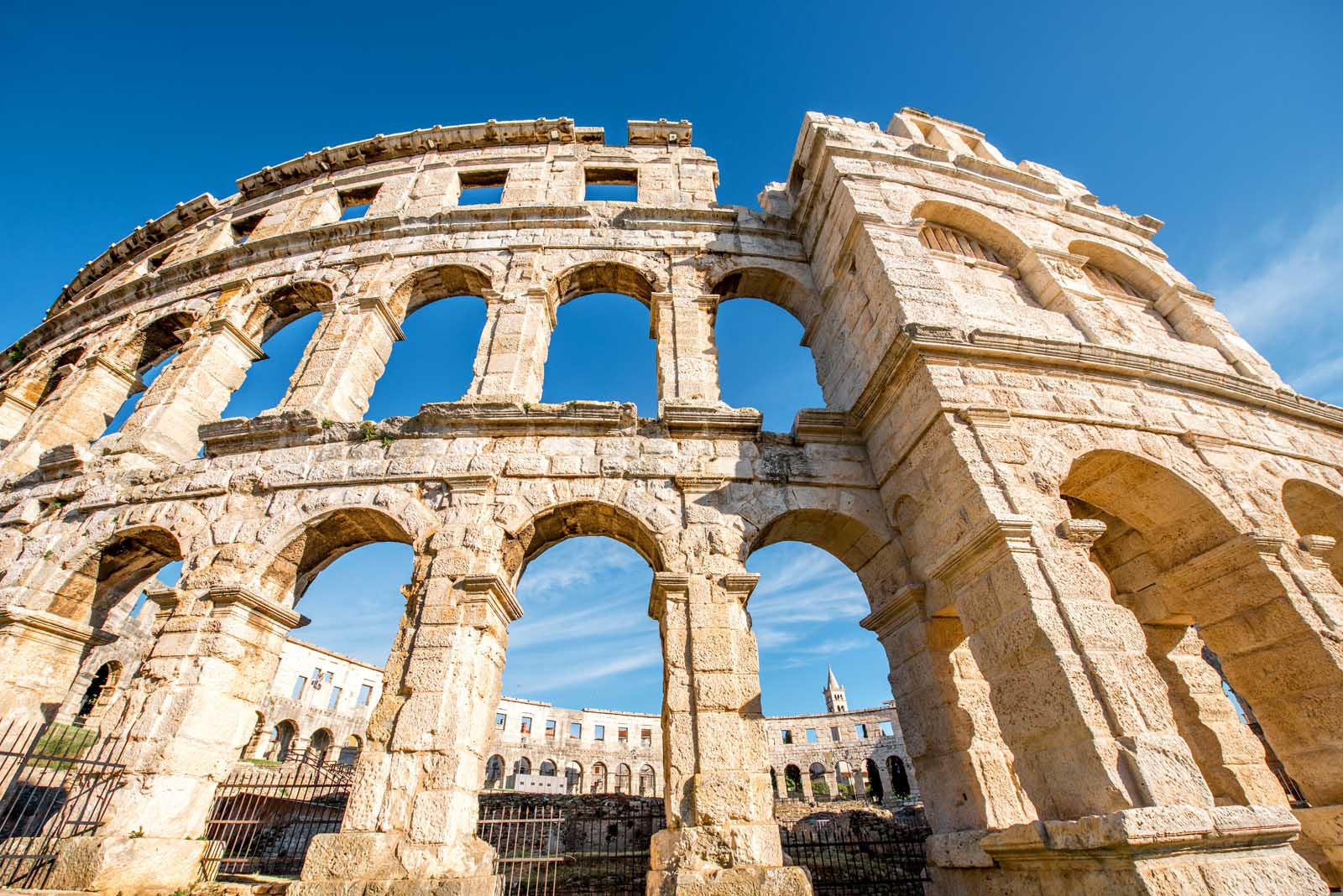
Croatia is full of medieval towns that tell the story of many rulers. But the Istrian Peninsula on the Adriatic Sea has a strong connection to the Roman era. The city harbors some of the most spectacular Roman architecture found in the country.
Pula has long had popular tourist attractions, from back when visitors would arrive in great numbers to watch the gladiators at the Roman Amphitheater. Today, the ancient town hosts the Pula Film Festival within the amphitheater.
Other historical attractions include the Byzantine chapel, the town square, a Venetian fortress and the old city gates. The surrounding countryside is easy on the eyes, plus Pula has several beautiful beaches.
Gornji Grad, Zagreb
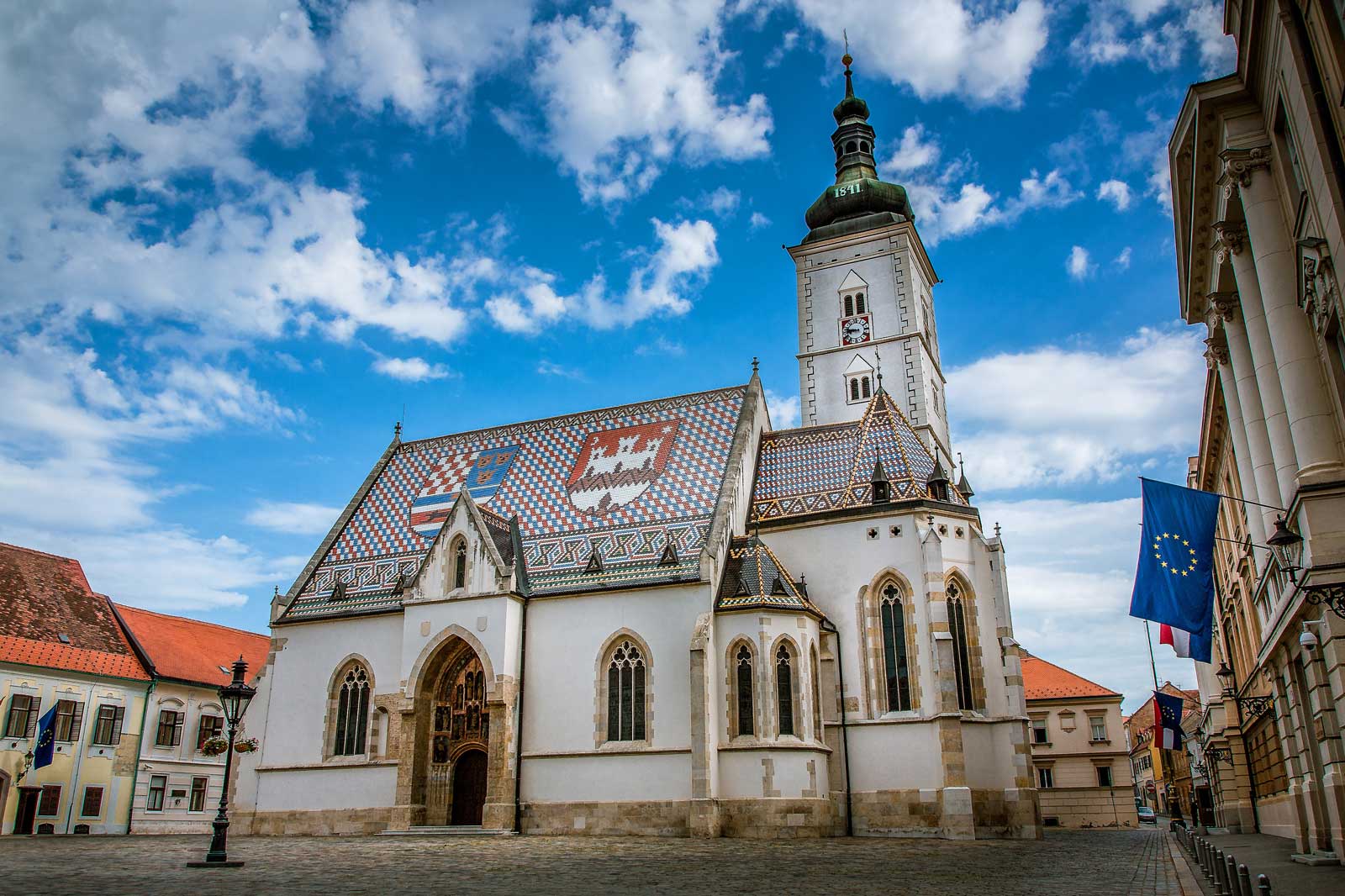
Visiting Croatia’s capital, Zagreb is one of the best things to do in Croatia. The reason travelers flock to the city is because of Gornji Grad, also known as the Upper Town.
Now an extensive metropolitan city, Zagreb’s rich history remains on display. Wander the cobblestone streets to experience the atmosphere at Ban Jelacic Square, roam the Dolac Market, or stroll along Strossmayer’s Walkway. Here musicians, artists and street performers go to work.
Popular destinations within Gornji Grad include the colorful Church of St. Mark, and the Tower of Lotrscak. Head here for spectacular city views.
Game of Thrones Tour
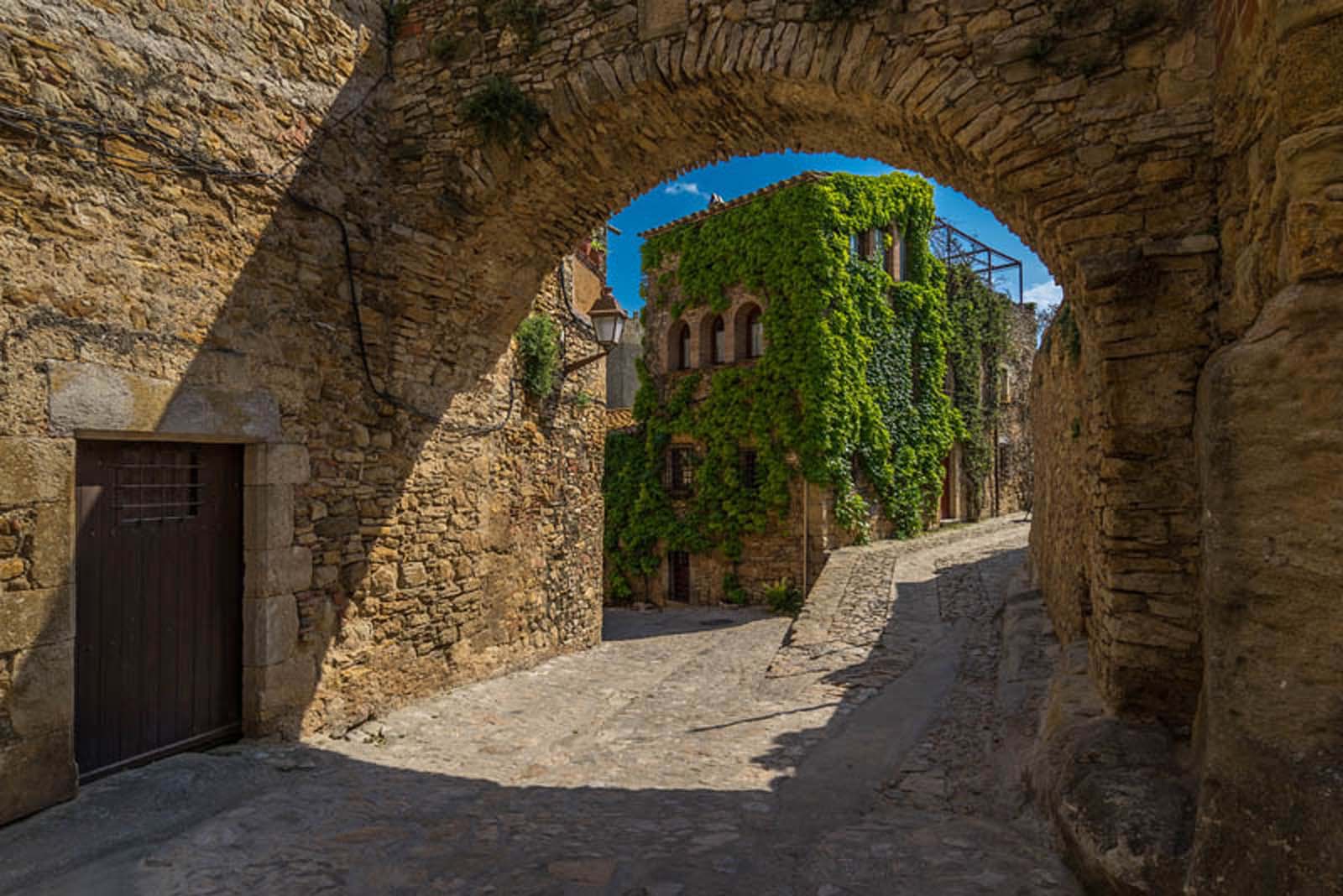
Croatia is home to many of the best filming locations for the hit TV show, Game of Thrones. From Mereen (Split) to King’s Landing (Old Town, Dubrovnik).
A great way to hit up all the sites while exploring Dubrovnik is on a walking tour. Your guide will take you to all the memorable locations while providing excellent historical insight. Stand in front of Blackwater Bay, or visit the location of King Joffrey’s wedding. If you’re a fan of Game of Thrones, this is an experience not to be missed. Want to see more GOT locations? Check out the full list here!
Mljet National Park
Reached via ferry from Dubrovnik, exploring the dense forests of Mljet National Park is one of the top things to do in Croatia. It also make for the perfect day trip from Dubrovnik. The western side of the remote island encompasses two bright blue lakes.
Croatia has eight spellbinding national parks and Mljet lives up to the country’s reputation. There are several hiking trails that run through the park, including one that runs along the lake’s edge.
To get out on the turquoise water, you can rent kayaks. While you can also jump on a water taxi to visit the Benedictine monastery built in the 12th century.
Korcula
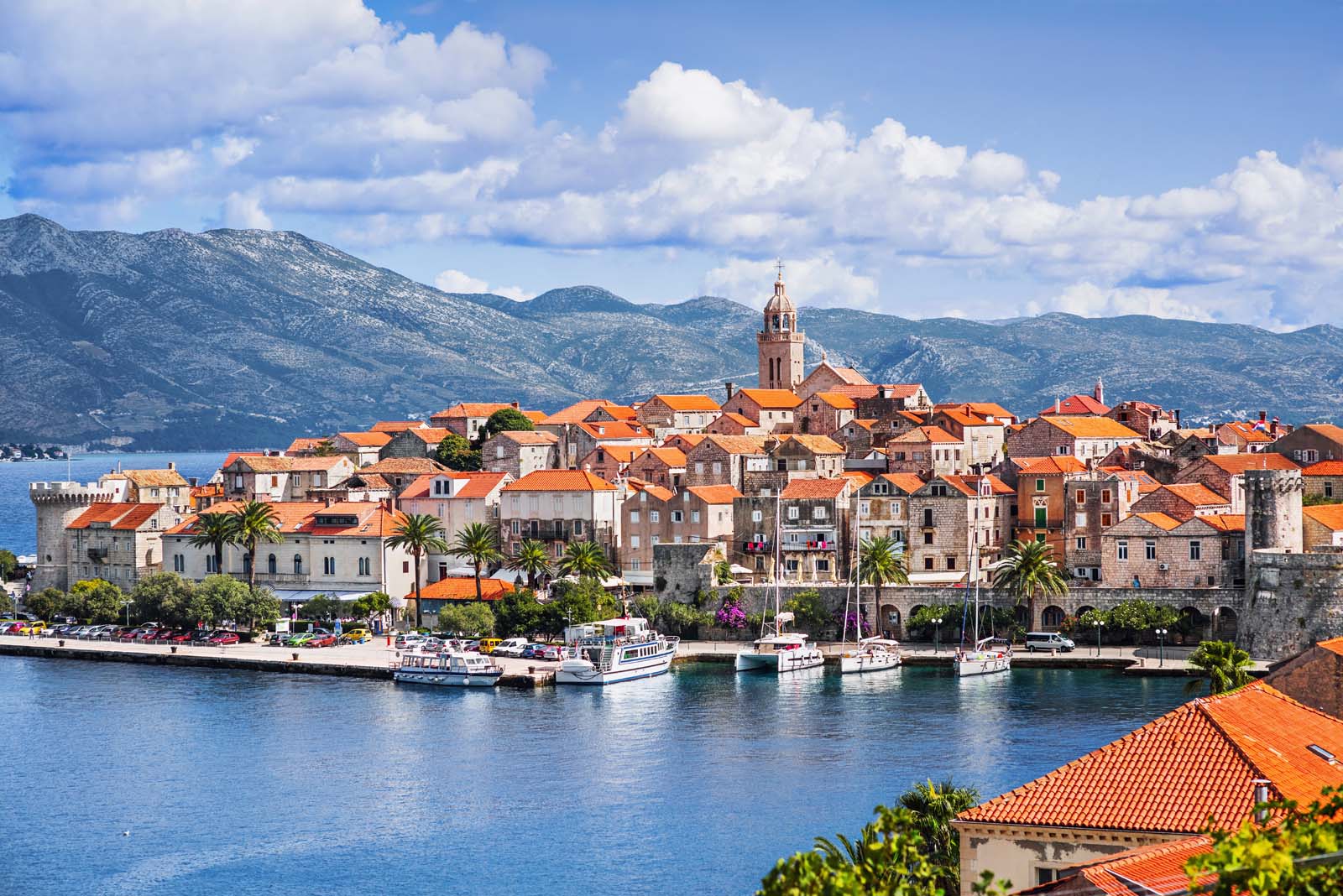
From stunning natural lands to beautiful medieval architecture, there are no let downs when visiting Croatia. Off the Dalmatian Coast, the island of Korcula, home to the birthplace of Marco Polo.
The principal city, also called Korcula, was built under Venetian rule, with its bright orange rooftops offering similarities to the northern Italian city. Korcula is a dream to walk around, with the area within the city walls being pedestrian only.
Fun things to do in Korcula include visiting the Marco Polo House and experiencing a Moreska Sword Dance held in the summer evenings.
Spanjola Fortress, Hvar
In Hvar Town is one of the most spectacular medieval fortresses in Croatia. Providing epic views after a bit of a workout. Created in the 16th century, the Spanjola Fortress was originally a method of defense.
Now the fortress is home to antiquities and several exhibits that provide a wonderful insight into life under Venetian rule. From the top of the fortress, you will have unbeatable views of Croatia’s Dalmatian Coast along with the old town of Hvar.
Diocletian’s Palace, Split
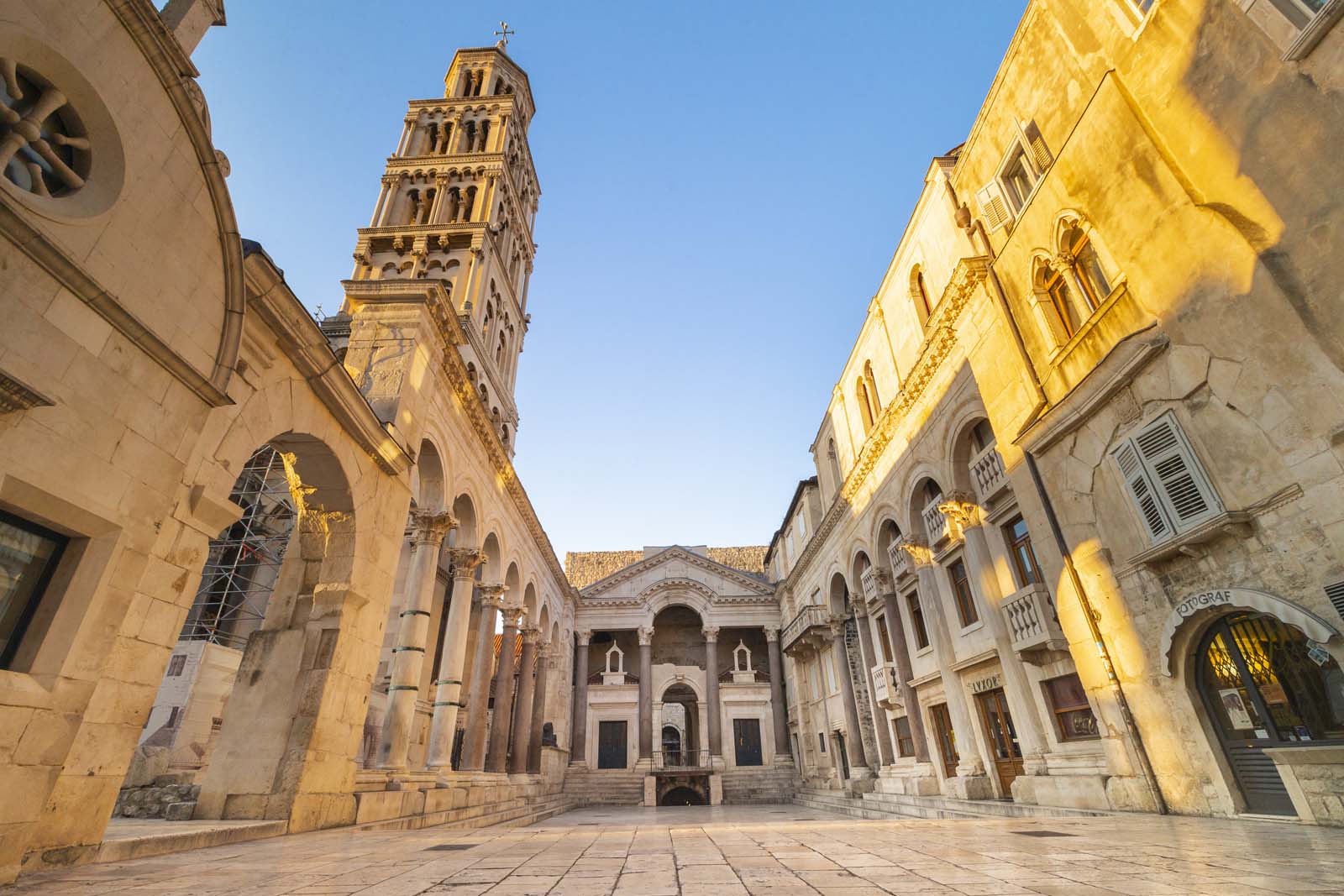
More a fortress than a traditional chateau, Diocletian’s Palace is the birthplace of Croatia’s second largest city, Split. The palace includes the city walls which come with four giant gates, one which can be accessed from the Adriatic Sea.
Roman Emperor Diocletian built and eventually retired here in 305ad. Today you can explore the Peristyle (the palace’s historic courtyard), along with the Cathedral of St Domnius. Enjoy the pedestrian only town and stick around for the illuminated ruins display at night.
Lokrum

Another must-see island on your travels around Croatia is Lokrum. For a memorable day trip from Dubrovnik, jump on the 15 minute ferry. On the island, you’ll soon discover that the only full-time residents are the local peacocks.
The paradise also features a sprawling saltwater lake, a brilliant Benedictine monastery and one of the several nudist beaches in Croatia. There are no cars here, or overnight camping, so it’s easy to find your own slice of paradise away from the crowds.
City Tower, Rijeka
A major earthquake may have brought down much of Rijeka’s historic buildings. But one that remains in the 21st century is the City Tower. With its famous bright yellow color, the tower was the original welcoming point for those arriving at the waterfront.
After the earthquake, City Tower received a few improvements, including the iconic clock which was installed in 1873. You will also notice the coat of arms along with statues of emperors come and gone.
After checking out the tower, check out the many small cafes and enjoy the local atmosphere.
Zlatni Rat Beach (Golden Horn)
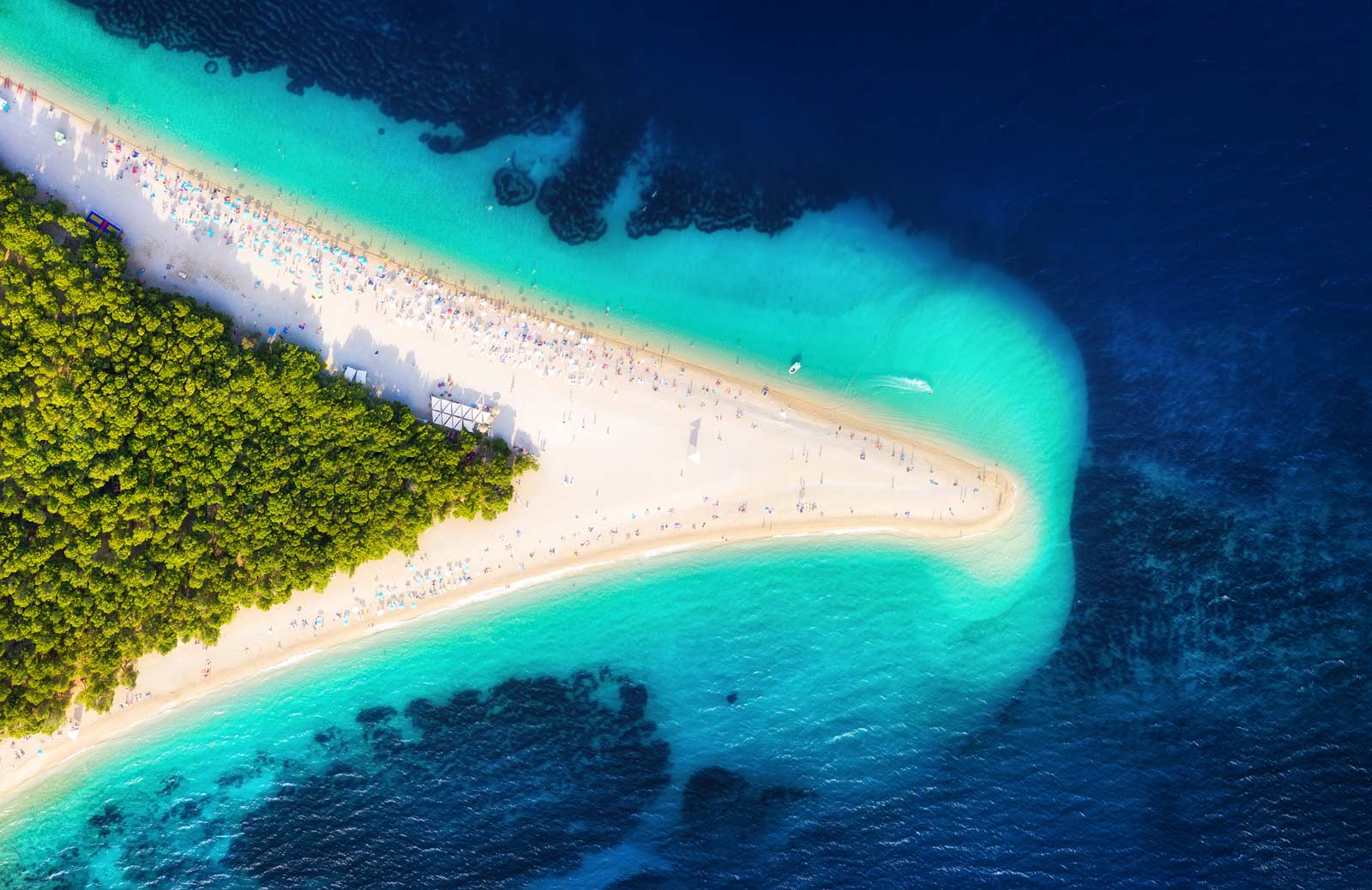
In a country of amazing beaches, Zlatni Rat Beach is often rated as the best of the lot. Popular and stunning, the beach grants prime access to the Adriatic’s pristine turquoise waters.
Zlatni Rat essentially is two stretches of golden sand and pebbles that connect, forming a triangle tip better known as Golden Horn. The fragile tip changes depending on the currents and prevailing winds, but never fails in providing epic photography. Sun bathing is the prime attraction, but you can also venture out on SUPs, kayaks or even windsurfing.
Batana Eco-Museum, Rovinj
North of Pula along the Istrian Peninsula is the coastal town of Rovinj. With colorful homes that rise out of the water’s edge, Rovinj is a traditional fishing village that also features a beautiful bell tower which soars above the skyline.
There are many beautiful beaches nearby, but the top thing to do in town is to visit the Batana Eco-Museum. On the waterfront, the museum explores the history of the batana, a traditional fishing boat used by villagers over many centuries.
Later, explore the tightly packed town with exceptional seafood restaurants and local art galleries.
Museum of Broken Relationships
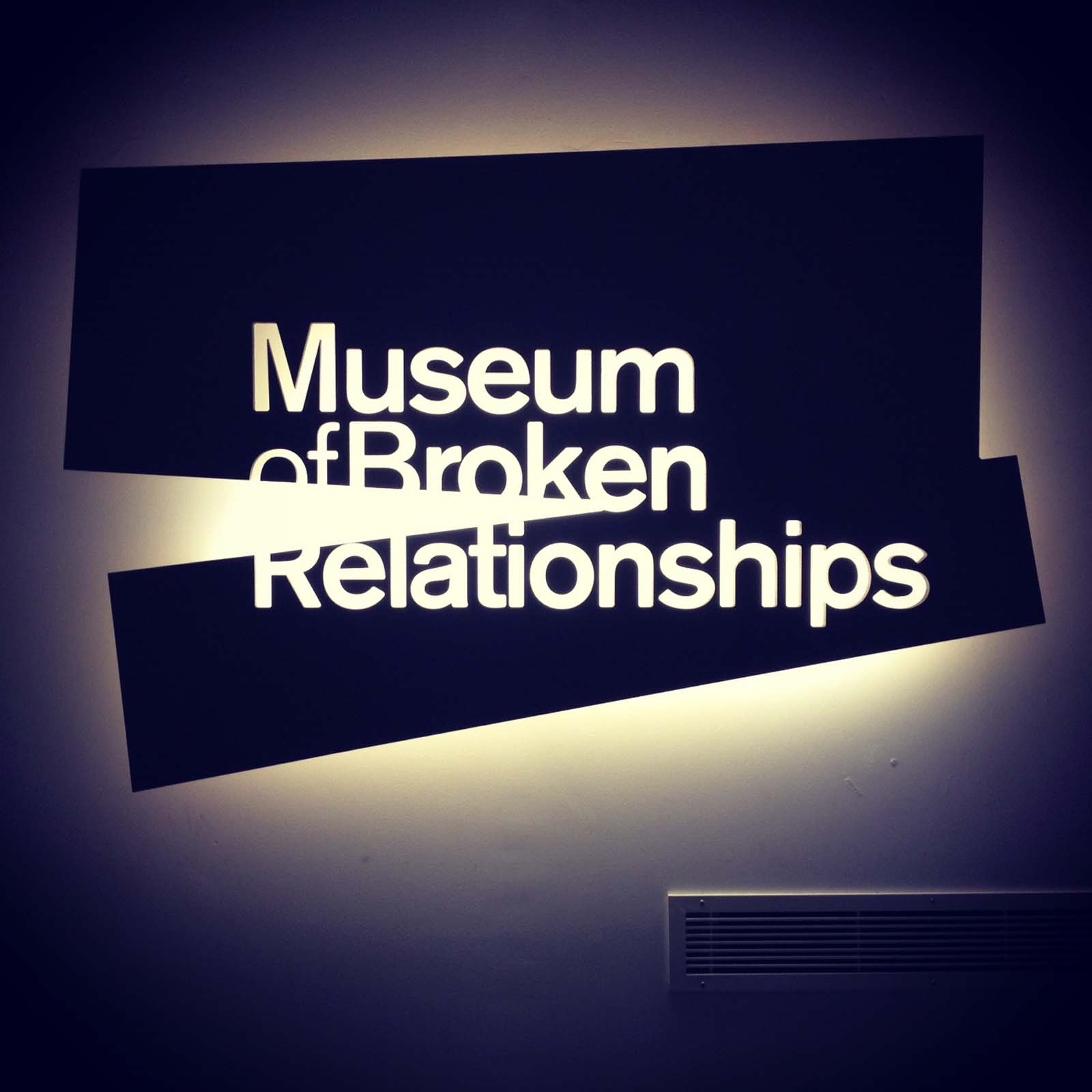
In Zagreb, the nation’s capital is one of the most unique and surprising museums you’ll come across on your travels. The Museum of Broken Relationships shines a light on love that didn’t go the distance.
As you wander through the halls and by the many displays, you’ll find hundreds of items left behind from breakups from all around the world. Accompanying each piece is a short story providing context which elevates every item to a piece of art.
There are two other sections. One is a virtual museum where people from around the world have uploaded their own items to be viewed. Second is the Confessional, which is exactly as it seems.
The Vineyards of Istria
If you enjoy your wine or simply can’t get enough of the countryside, one of the best things to do in Croatia is to visit the many Vineyards in the Istrian region.
The local landscapes are stunning and provide access to many ancient villages that are off the typical tourist trail. White wine is prominent in this region, however, the vineyards here offer some of the best orange wine going around. Yes, orange wine is a thing. Get in on the action by visiting Roxanich Winery.
Important Information about Croatia
With the best things to do in Croatia covered, what else should you know about exploring this amazing country?
Getting to Croatia
The simplest and often cheapest way to get to Croatia is by plane. Croatia has five major international airports, with Zagreb, Split and Dubrovnik airports being the biggest.
For more scenery and an instant glimpse of Croatia’s epic coastlines, catching a ferry is also common. Ferries from Italy and Greece leave regularly to major coastal cities, including Split and Dubrovnik.
What’s the Best Time to Visit Croatia?
Each season in Croatia will bring a different experience to your travels. High tourist season runs through the European summer (June to August) and for good reason. Arrive in the summer for perfect weather, festivals and prime sailing. Direct flights are more prevalent at this time of year, however, you’ll have to book accommodation in advance.
Spring and fall are also great times to visit Croatia. These months bring lower temperatures, which will make longer hikes and outdoor experiences more appealing. You’ll also enjoy quieter ‘old towns’, while attractions that shutdown for the winter remain open.
The winter is not the best time to visit Croatia. With colder temperatures, it’s hard to enjoy the beautiful coastline and sandy beaches. However, if you must, there are many festivals to attend, especially around Christmas. Plus the Olive Oil Fair in November. If you’re willing to battle the cold, national parks like the Plitvice Lakes can be explored essentially by yourself.
Where to Stay in Croatia?
There are many exciting cities and small towns to experience on your travels in Croatia. From Old Town Dubrovnik to the Istrian Peninsula. Below, we have listed three great places to stay in Croata to suit each budget.
- Budget – Within walking distance of this well-appointed guesthouse, you’ll find many of Zagreb’s top attractions. Rooms at Houzzz21 come with free WiFi, private bathrooms, kitchens and often a balcony or terrace.
- Mid-Range – At Villa Sigurata II, walk out your door and immediately be in Dubrovnik’s spectacular Old Town. With airport shuttle included, free WiFi and help with tours, you can check your worries at the door. Within a minute walk be at Onofrio’s Fountain and the St Saviour Church.
For an extensive look into where to stay in Dubrovnik, read our guide.
- Luxury – Sveti Stefan is a small island connected to the mainland via a narrow bridge. The village dates back to the 15th century and remains relatively unchanged. The only difference? Each building’s interior has been repurposed into some of the best luxury accommodations in Croatia at Aman Sveti Stefan.
Now that you’ve seen the best things to do in Croatia, ready to explore further afield? Check out our list of the best places to visit in Europe.
Photo of Museum of Broken Relationships Patty Ho, CC BY 2.0, via Wikimedia Commons

